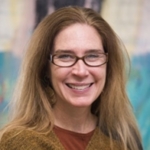Interviewer: Jozie Billings
Interview Date: February 20, 2024
Location: Interview recorded over Zoom
Duration: 1:06:49
Dr. Melissa Cheyney discusses her childhood growing up in Miami, Florida in the Little Havana neighborhood, where she developed her interest in cross-cultural experience surrounded by Cuban culture. Cheyney also discusses the drug culture in Miami in the 1970’s and how that affected her life and family. Cheyney relates how her high school teachers piqued her interest in Calvin College, where she ultimately ended up going for her undergraduate studies, obtaining a BS in Biology and a BA in Ancient and European History. Cheyney then explains how she went to Western Michigan to continue her schooling in Bioarchaeology. Reflecting on both her undergraduate and graduate years, Cheyney recalls doing fieldwork in Jordan, where a local midwife sparked her interest in midwifery and working with living populations. Cheyney then recounts her time at University of Oregon obtaining her PhD in Medical Anthropology. Cheyney then shares how she slowly became involved in midwifery, started first with training as a doula, then additional training to become a midwife. Cheyney shares that by 2005, she had received her PhD and had also become a Professional Certified Midwife.
Moving to a discussion of her time at OSU, Cheyney starts by reflecting on the labs that she co-directs at the university, the Reproductive Health Lab and the Uplift lab, which encourage collegiality and focus on reproductive health and equity. Cheyney then explains that her appointment is 50% teaching, 40% research, and 10% service. Cheyney shares how the teaching load is fulfilled through her instruction in classes like Medical Anthropology, Reproductive Justice, Osteology, and Human Evolution. Cheyney then reflects upon her service within the university, such as being the chair of the Institutional Review Board at OSU, mentoring students of all levels, and serving on the curriculum committee. She likewise discusses her service outside of the university, such as being the chair of the board of Licensed Direct Entry Midwifery for six years, serving on government appointed commissions, her work with the Community Doula Project, being the director of the Midwives Alliance of North America statistics project, co-directing the Community Birth Data Registry, and being involved at the national level with the Quality Maternal Newborn Care Alliance. Cheyney then shares her hopes that the field might bring more perspectives to the table and open space for collaboration. Cheyney also reflects on what her time has been like at OSU, and the support that she received from the Dean when she was just starting her career.
Lastly, Cheyney shares a story of one of her experiences doing fieldwork as a midwife in the Amish community, in which she really started to understand cultural performativity and that birth is not cross cultural. As the interview draws to a close, it is decided that a second interview will be held so that Cheyney can have appropriate time to share a final story of her favorite birth
experience.
Dublin Core
Title
Description
Moving to a discussion of her time at OSU, Cheyney starts by reflecting on the labs that she co-directs at the university, the Reproductive Health Lab and the Uplift lab, which encourage collegiality and focus on reproductive health and equity. Cheyney then explains that her appointment is 50% teaching, 40% research, and 10% service. Cheyney shares how the teaching load is fulfilled through her instruction in classes like Medical Anthropology, Reproductive Justice, Osteology, and Human Evolution. Cheyney then reflects upon her service within the university, such as being the chair of the Institutional Review Board at OSU, mentoring students of all levels, and serving on the curriculum committee. She likewise discusses her service outside of the university, such as being the chair of the board of Licensed Direct Entry Midwifery for six years, serving on government appointed commissions, her work with the Community Doula Project, being the director of the Midwives Alliance of North America statistics project, co-directing the Community Birth Data Registry, and being involved at the national level with the Quality Maternal Newborn Care Alliance. Cheyney then shares her hopes that the field might bring more perspectives to the table and open space for collaboration. Cheyney also reflects on what her time has been like at OSU, and the support that she received from the Dean when she was just starting her career.
Lastly, Cheyney shares a story of one of her experiences doing fieldwork as a midwife in the Amish community, in which she really started to understand cultural performativity and that birth is not cross cultural. As the interview draws to a close, it is decided that a second interview will be held so that Cheyney can have appropriate time to share a final story of her favorite birth
experience.

